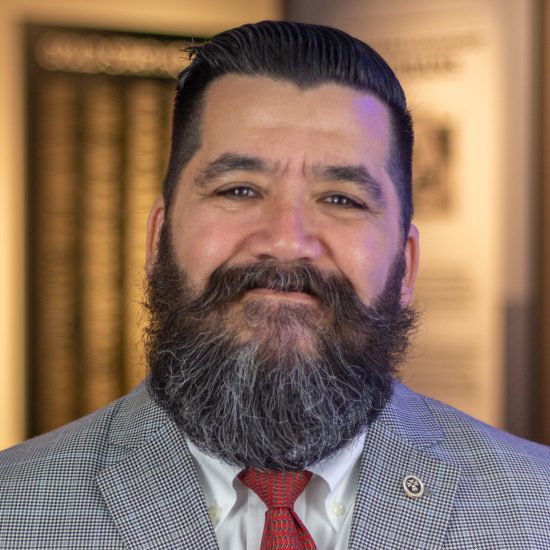Tovar, SAM HOUSTON 1986, discusses the importance of being authentic to yourself — and the importance of making a difference in the lives of others — as he seeks to launch a nonprofit to meet the needs of young adults diagnosed with autism and developmental and intellectual disabilities.
The driving forces behind Order of Constantine Sig Jose Tovar’s, SAM HOUSTON 1986, decision to quit his job and focus full-time on establishing a nonprofit day program for young adults with autism and developmental and intellectual needs are twofold. First is love for his son, Marcos, and second is needing to come up with a solution to a problem. Lengthy waitlists at facilities that meet the needs of such adults keep his own son from enjoying an independent lifestyle, and the waitlists keep Tovar from having peace of mind about his son’s safety and security as they both age. Studying and teaching the Transformational Leader Program’s True North Leadership Certificate material helped put into perspective his purpose and act as the catalyst for founding the nonprofit Redoma.
Tovar discusses below the challenges he and his son have faced with receiving affordable and accessible care, the deeper meaning of the name Redoma, the role the Fraternity has played in his life, and his approach to transformational leadership and what putting that into practice means to him.
You’re a father to a young adult on the autism spectrum disorder. Tell me more about your son, Marcos, and the kind of relationship you both share.
There are a lot of blessings, but there also are some challenges. I get a lot of hugs. Together we go to church. He loves to go out and eat, and he’s got a very good taste, so it can be expensive. He’s very adventurous, and he loves staying in hotels. He loves the whole idea of going someplace. It’s not so much about a destination as much as, ‘Hey, this is a new room.’ He’s a great traveler.
He may be 22, but in a lot of ways he is just a typical father-son teenage relationship where, for example, if I change the words of a song or if I make jokes, he finds it embarrassing, and then in some instances, he loves it.
There’s some things that I will never experience. Like, I will not have grandchildren, and I will not be at his wedding. There’s just certain things that are not possible. It’s something that I’ve come to accept.
What kind of challenges have you and your son faced as he’s entered adulthood?
Pre-COVID, we sought help with what is called ABA, adaptive behavior analysis therapy. I had a fantastic group of people that saw my son grow up, and these are the same folks that would support me when I work and travel.
This place [Marcos] was going to was a fantastic place. I did not know how spoiled we were, how beautiful and how good these people were. The challenge as he became an adult is that services for insurance were no longer paid [Texas recently expanded coverage for ABA therapy after Marcos had aged out]. They started questioning the benefits of the therapy before he turned 16. The idea that therapy stops and you no longer need therapy after a certain age is just dumbfounded to me. [The facility] told me, ‘Hey, the insurance will only cover so much. Can you pay the rest?’ Absolutely. And they give me a prorated rate, and then sometimes, when I couldn’t pay, they would give me credit, and later I would pay it. And then eventually, the insurance just said, ‘No, we’re just not going to cover it.’
So, you know what [the facility] did? They developed a day program where I could pay out of pocket. For the two years he was there before COVID, I was paying out of pocket, and it was affordable. Yeah, I was paying out of pocket, but it was worth it. He was safe. He was loved. It was people that he knew. And they just sort of offered this program to him and his peers.
But eventually, when COVID died down, it changed dramatically. People that knew him, all of that just dried up. When you enter adulthood, insurance doesn’t pay for it. So, you don’t see as many facilities offering support and services. There’s some good ones out there, and there’s the waiting list for them, and then there’s some that are not so good. So, we started looking for some facilities. He wants to be independent. He wants to have his own place where I don’t have to tell him to turn the light off or make the bed.
You worry about the services, what kind of social life you can offer them, and then there’s the question of continuity. What happens when I’m gone? Those are things that can be quite overwhelming. But, there’s ways to navigate that. You pray for the future, but you focus on the present. Be in the moment — this is what matters.























